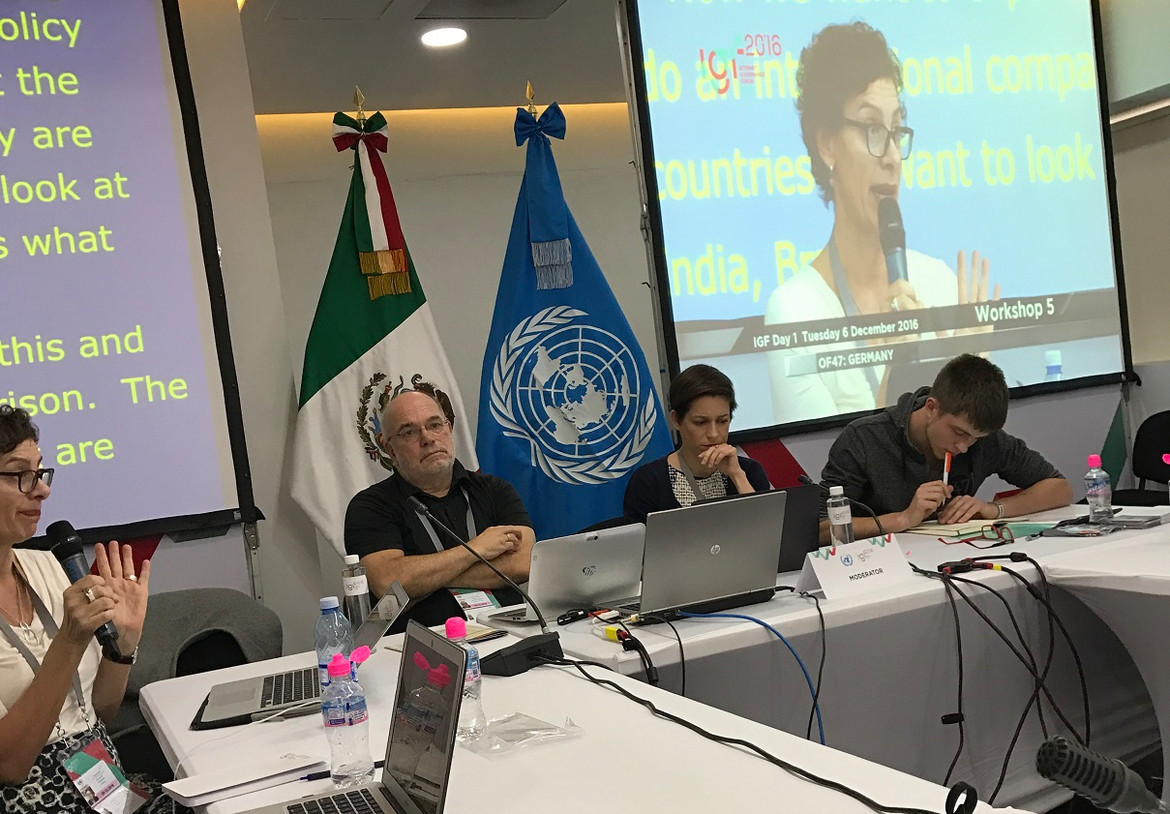Having a Voice as a Stakeholder in the Internet
Helping to define the digital world of the future: Michael Rotert, Honorary President of the eco Association, explains how each of us can have a voice in global Internet governance discussions.

© Rawpixel | istockphoto.com
There’s a lot of talk at the moment about what kind of world we will be living in in the future, and will be leaving for our grandchildren. On many levels – from the climate, to the aging population, to access to education, and on through to topics like new work and artificial intelligence – there is some uncertainty, and there is hope for innovative solutions. Digitalization can contribute to solving a range of global problems, but to achieve this, we also need to consider how digitalization will change our world, and what it is we want from this transformation.
These are not idle considerations: It is possible for each of us to participate in our own way in the shaping of our future digital society. Everyone is a stakeholder in this change, and everyone can participate in the global discussions and negotiations on Internet governance, to help shape the world we want – for us as private individuals, as business people, as industry leaders, as parents (and someone else’s children), as members of communities, representatives of governments - and the list goes on.
Internet governance has trialed and proven the value of a new style of global negotiation, the multi-stakeholder model. And it works, as the historic process of freeing ICANN (the Internet Corporation for Assigned Names and Numbers, responsible for the administration of domain names in the Internet) from the supervision of the US government, clearly demonstrated.
So, just in the same way that you can join a professional association, a political party, or an environmental lobby group, people interested in how the Internet and digitalization will evolve and be managed in the future can get involved in Internet governance.
Who can get involved in Internet governance?
Participants in Internet governance include members from governments, the private sector (e.g., technology companies, infrastructure providers, etc.), civil society (e.g., NGOs, human rights defenders, etc.), the technical community (e.g., computer scientists, Internet networking engineers, etc.), and academia (e.g., university professors, research scholars, etc.). The topics include shared principles, norms, rules, decision-making processes, and programs that shape the development and use of the Internet. Discussions take place according to the multi-stakeholder model, which means that everyone is able to participate equally, and no stakeholder is more important than any other.
So how and where can you get involved in Internet governance?
The Internet Governance Forum (IGF) is a United Nations-supported initiative that brings people and organizations together from the various stakeholder groups, as equals, to discuss public policy issues relating to the Internet. It was created in 2005 during the United Nations World Summit on the Information Society (WSIS) as part of the 2005 Tunis Agenda for the Information Society (paragraph 72), and its mandate was renewed for another 10 years by the U.N. General Assembly in 2015.
This year, the IGF is taking place in Paris, France, from November 12-14. Under the title of “Internet of Trust”, topics include everything from cyber security and preventing terrorism through to sustainable development goals, digital inclusion, gender issues, digital rights for refugees, how young people use digital technology, and algorithmic transparency, just to name a few. More information can be found via the IGF website www.intgovforum.org.
But you don’t have the time or the travel budget to attend IGF meetings?
As well as attending face to face, it’s possible to attend Internet governance events from your desktop. Both the IGF and the regional/sub-regional and national IGFs generally offer remote participation. This allows you to participate even in very specific sessions without time-consuming travel. Within the session schedule, there’s normally the possibility to choose a session and simply click on it in order to participate.
According to the organizers of the IGF, you have the following options:
- Online participation (Cisco's Webex)
- Live captioning
- Webcast
For the upcoming IGF 2018 there is currently no information available, but you should register as a remote participant in order to get to the information and session links.
“Remote Hubs” may also be set up in your city, or one close to you, which means you can attend a local meeting to watch sessions etc. Information will be published on the website as soon as it is available.
For the European perspective, EuroDIG – the European Dialogue on Internet Governance – usually takes place each year in May or June. In 2019, it will be in The Hague, Netherlands. More information can be found via the EuroDIG website www.eurodig.org.
IGF Glossary
IGF – Internet Governance Forum
BPF – Best Practice Forum
MAG – Multi-stakeholder Advisory Group (the group of people appointed by the UN Secretary-General to manage and organize the IGF).
DC – Dynamic Coalition
Multi-stakeholder – refers to a process where multiple stakeholders (usually from all different fields – technical community, governments, civil society and academia, intergovernmental organizations (such as the UN), and the private sector) are involved.
Remote hub – an area set up away from the meeting with the aim of enabling people in different countries to listen to and participate in the IGF proceedings.
IGO – intergovernmental organization, e.g. the United Nations
UNDESA – United Nations Department of Economic and Social Affairs
WSIS – World Summit on the Information Society
An inclusive global platform to inform and inspire policy-makers on Internet topics
While the IGF has no negotiated outcomes or policy-making powers, like some other UN institutions, it is the only multi-stakeholder platform that enables parties to come together to discuss important Internet challenges and issues. As you can see at these meetings, participants get involved in discussions, exchange information, and share best practices on various Internet-related topics. The IGF serves to inform and inspire those with policy-making powers in both the private and public sectors, as well as shed light on various issues by incorporating voices that are often excluded from global policy discussions. It also helps people to reach a common understanding of how to maximize Internet opportunities and address the risks and challenges that are constantly arising.
The IGF has one large meeting every year where a number of activities take place, most of which are led by the multi-stakeholder community itself (e.g. workshops on various topics), as well as local, national, and regional IGFs. In addition, the IGF also has “intersessional activities” (i.e. those activities that take place throughout the year), like the Best Practice Forums (BPFs) and Dynamic Coalitions (DCs).
The Best Practice Forums, or BPFs, are community-led projects that work on specific themes throughout the year. Their primary aim is to encourage broad stakeholder input to define and gather effective and/or efficient practices in order to address important challenges in Internet governance.
They present their findings at the IGF meeting, and you are welcome to attend – but you can also read their reports, which are published on the IGF’s website.
Dynamic Coalitions, or DCs, are informal, issue-specific groups comprising of members of various stakeholder groups. Some active DCs which might be interesting for industry participants are:
National, Sub-Regional, and Regional IGF Initiatives
The national, sub-regional, and regional IGF initiatives (NRIs) are IGF events held around the world throughout the year. They gather stakeholders locally or regionally for a one, two, or even three-day event, and they produce “messages” summarizing what they discussed and the outcomes of the meeting, which feed into the global IGF. Each year, the NRIs have a main plenary session at the IGF, as well as a number of auxiliary sessions throughout the week.
A variety of workshops and sessions are held at the IGF meetings. As sessions overlap, make sure that you identify sessions you find potentially interesting or relevant beforehand and work out your own agenda for the meeting accordingly. You can find details by reading the selected workshops and selected open forums lists. Everyone has an equal opportunity to speak when the panel moderator opens the floor. Besides respecting other participants, and not verbally attacking anyone personally, there are no rules. Read more about the IGF’s guidelines for participation at www.intgovforum.org/cms/Guidelines%20for%20Participation.pdf.
More information on Internet Governance and how to get involved can be found on the following websites:
European Dialogue on Internet Governance (EuroDIG)
Other conferences and events
- IETF: www.ietf.org/
- Peering (Internet exchange point) conferences, such as Central and Eastern Europe Peering Days
- World Summit on the Information Society (WSIS) Forum: www.itu.int/net4/wsis/forum/2017/
- European Summer School on Internet Governance (EuroSSIG): eurossig.eu/eurossig/
Other resources
- DiploFoundation's IG acronym glossary: https://www.diplomacy.edu/resources/books/internet-governance-acronym-glossary
- WSIS Tunis Agenda for the Information Society: https://www.itu.int/net/wsis/docs2/tunis/off/6rev1.html
- Why the multistakeholder model works: www.internetsociety.org/doc/internet-governance-why-multistakeholder-approach-works
Michael Rotert is a pioneer and veteran of the Internet industry – and was the first person on German soil to receive an email. Amongst other posts, his stellar career spans Technical Head of the Data Center of the Informatics Department at the University of Karlsruhe, Founder and Managing Director of the ISP Xlink (later KPNQwest), and managing directorships of various service providers. After stepping down from his long-standing service as Chair of eco – Association of the Internet Industry in 2017, he became Honorary President of the eco Association in the same year. Rotert is also a founding member of the Internet Society, DE-NIC, and other Internet bodies, and contributes his industry expertise through membership of numerous committees and advisory councils.





